|
|
Posted 10/6/2014 (link)
 Charles Bernstein has just posted the latest episode in his long-running series, Close Listening, featuring poet Cia Rinne. You can read more about the program and listen to both installments in this Jacket2 commentary post.
Cia Rinne was born in Sweden from a Finnish family and raised in Germany. She has studied in Frankfurt/Main, Athens and Helsinki. Rinne is the author of the books zaroum, and notes for soloists, as well as being a collaborator on numerous multimedia and performance works. The program was recorded on September 30, 2014.
In the first program, Rinne reads zaroum, notes for soloists, and a set of more recent works. Segments are available for the individual pieces as well as discussion of each. In the second program Rinne and Bernstein discuss poetry and nationalism, the possibilities for a multilectical poetry, and Rinne's work documenting Roma culture.
You can listen to a wide array of recordings from Rinne on her PennSound author page, and explore many years worth of Close Listening recordings here.
Posted 10/8/2014 (link)
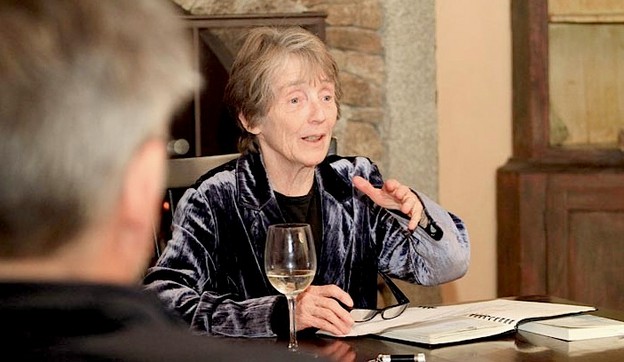 Earlier this week we launched the eighty-first episode in the PoemTalk Podcast series, in which two poems by Fanny Howe — "The Descent" and "The Source" — were the topic of discussion. Joining host Al Filreis for this program were Laynie Browne, Rae Armantrout, and Kerry Sherin Wright.
In a post on the PoemTalk blog, Filreis traces the path the panelists took through the two poems: "Starting with 'The Descent' and the moving to 'The Source,' the PoemTalkers took the poems literally and figuratively, in turns. 'The Descent' might mark the descending arrival of an airplane, perhaps bound for a site of meditation. For 'The Source' they even worked to imagine a tall, Babel-like pole with wet film at the top. Nothing about these poems inhibits such efforts to set scenes. Ultimately, though, 'The Descent' seems also to be about a means of measuring depths sounded by inner exploration, while 'The Source' has its source in the poem itself as a site for searching for the source, a holy atheism, an illumination we might have once thought was bracingly Arctic (as in a source of fresh, redefining air) but turns out to be in the very letter of this writing." You can read the rest of his introduction on Jacket2.
PoemTalk is a co-production of PennSound, the Kelly Writers House, Jacket2 and the Poetry Founddation. If you're interested in more information on the series or want to hear our archives of previous episodes, please visit the PoemTalk blog, and don't forget that you can subscribe to the series through the iTunes music store.
Posted 10/10/2014 (link)
 We've just added several new recordings to the PennSound author page of poet Barbara Henning.
We start with both video footage and a short audio excerpt from Henning's February 29, 2012 reading at the St. Marks Poetry Project Reading with Frances Richard. There's also Henning's January 6, 2014 appearance on the radio program "Write the Book," hosted by Shelah Shapiro and broadcast by Burlington, VT's WOMM-FM. Finally, from Tucson's POG reading series, we have a September 26, 2009 reading.
These recordings join a considerable body of readings already housed on our Henning author page, including a number of additional recordings from Tucson, a 2002 set from Boulder's the Left Hand Reading Series, a 2005 Poetry Project reading, a 2007 reading at the Bowery Poetry Club, and a 2009 conversation with Harryette Mullen recorded as part of the Belladonna* reading series at Poets House, NYC.
Posted 10/13/2014 (link)
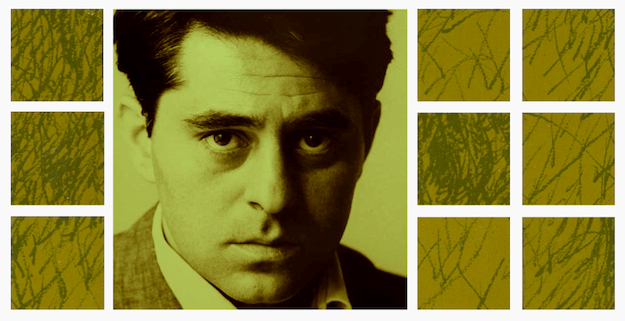 We're especially grateful to Rosemary Ceravolo, widow of the legendary Joseph Ceravolo for sending us two cassettes to add to our Ceravolo author page.
The first of these, containing home recordings made in 1971 runs a little more than half an hour and includes selections from Wild Flowers Out of Gas, plus "Ho Ho Ho Caribou" (here divided into its ten sections), the first three sections of "The Hellgate," and "Where Abstract Starts." That's followed by a lengthy set of forty-nine poems recorded at the University of Chicago on May 11, 1976. Some titles included in this set: "Winds of the Comet," "Sleeping Outside My Mind," "The Spirit Mercury," "Interior of the Poem," "Kyrie Eleison," and "Good Friday." As Rosemary Ceravolo notes, there are some differences in titles between these recordings and the recently-published Collected Poems since "Joe must have changed or added titles after he did the readings."
While you're acquainting yourself with these new recordings, don't miss out on the other recordings housed on our Ceravolo author page, including a 1978 set at the Ear Inn and home recordings from the spring of 1968, along with the September 2013 celebration of Ceravolo's work at the Kelly Writers House, organized by CAConrad. Finally, if you haven't already, you'll want to head over to Jacket2 for "The Lyrical Personal of Joe Ceravolo," an ambitious 2013 feature organized by Vincent Katz.
Posted 10/15/2014 (link)
 The National Book Award shortlists were announced this morning and it was a pleasure to see three PennSound poets among the poetry finalists:
Claudia Rankine was nominated for Citizen: An American Lyric (Greywolf), which, Shaelyn Smith of The Rumpus notes, "mixes poetry with art, essays and images from the news to share her own experiences of racism ... and to reflect on stories that have made their way into the national conversation about race, like the death of Trayvon Martin and fallout from Hurricane Katrina." You can listen to seven recordings recorded between 2002 to 2012 in Paris, New York, San Diego, Berkeley, and here at UPenn, including radio appearances, readings and conversations on her PennSound author page.
Fred Moten's latest, The Feel Trio (Letter Machine Editions) was also cited. Tyrone Williams recently discussed this volume in his Jacket2 commentary series, "Hunches, Hedges, etc." calling it "a blunt, unsentimental (it is written against both pathology and apotheosis vis-à-vis Negro, black and African American cultures) survey of a commons that continues to thrive underground," that "like his other [books], is written against forgetting, which is to say, written for a future that will have always been." Moten's PennSound author page is home to a small but potent collection of recordings, including two Segue Series sets, readings at the University of Kansas, Lawrence, and our own Kelly Writers House, and a lecture at UPenn as well.
Finally, Fanny Howe made the list for her latest collection, Second Childhood (Greywolf), which was hailed by by Craig Morgan Teicher in The New York Times Book Review as "offer[ing] glimpses of the unseeable, shards of the unsayable, between the slats of the words, between meanings." He continues, "Whether we see what this reflexive poetry tries to show may have more to do with our own sense of faith — in language, if not in God — than with hers." PennSound's Fanny Howe author page contains a diverse archive of recordings from the late seventies to the present, including talks, readings, radio appearances and a musical setting of her poem, "Tis of Thee."
Posted 10/17/2014 (link)
 We recently added a number of newly-digitized recordings from the Segue Series' second home, Double Happiness that were made in the late nineties and early oughts. Highlights include John Yau reading in December 2001, Anselm Hollo and Garrett Kalleberg reading in February 1998, Brian Kim Stefans and Joan Retallack reading in January 2002, a trio reading by Jonathan Skinner, Johanna Fuhrman, and Laird Hunt from February 2001, Maggie Nelson and Adeena Carsick reading later that same month, and three events from April 2000 featuring Pattie McCarthy and Heather Ramsdall and Tim Griffin and David Levi Strauss, and Greg Fuchs and Janice Lowe.
As part of the same project, we also digitized two readings from HERE, an alternate venue for the series during its years at the Ear Inn: Yunte Huang and Leslie Scalapino reading in February 1998, and Tom Raworth and Ann Lauterbach reading in October 1997. Follow the individual links above to listen to any and all of these readings.
Posted 10/20/2014 (link)
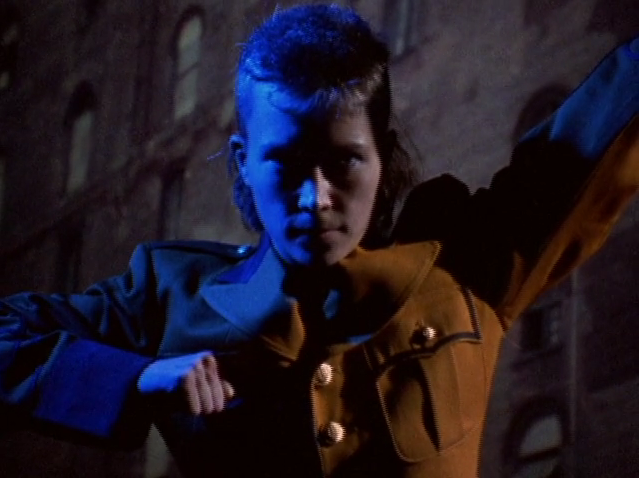 PennSound has been very happy to host work by filmmaker Henry Hills for many years now, and today we've added an exciting 1994 collaboration between Hills and choreographer Sally Silvers, "Little Lieutenant." Here's Hills' summary of the film:
Little Lieutenant is a look back at the late Weimar era with its struggles and celebrations leading up to world war, a period piece. Scored to John Zorn's arrangement of the Kurt Weill song, "Little Lieutenant of the Loving God", and drawing its imagery both from the original song and its somewhat idiosyncratic rearrangement, the film presents an internal reading of Silvers' solo scored to the same musical piece, "Along the Skid Mark of Recorded History". Closely following the Zorn arrangement, the film was storyboarded in 30 scenes (the arrangement changes approximately every 4 measures) and principally shot in a small studio employing rear screen projection, with foreground movement choreographed to interact with the projected imagery which reflects themes apparent in the song and its arrangement (Weimar cabaret scenes, labor footage, empty industrial landscapes, water, slides of moody photographs by James Casebere, a kinescope of Silvers' performance of the solo at the Joyce Theatre, battle newsreels, Walther Ruttmann's film Berlin: Symphony of a Great City, and a restructured animation, The Youth Machine). Scenes range through a Citizen Kane-esque pan up a forboding structure, idyllic lovers in both pastoral and industrial settings, labor marches, a lonely walk down a deserted alley, a bar brawl, a Motown-ish girl group, a dream sequence, and a giddy animation, up to the terrors of war and a bittersweet conclusion: an elaborate music video.
To watch this film, and many more Hills works spanning thirty years, visit PennSound's Henry Hills author page.
Posted 10/22/2014 (link)
 Following Monday's new addition from Henry Hills, here's another interesting film just added to PennSound's video holdings: Dan Ochiva's "Jack and Kate." Charles Bernstein introduced the piece yesterday in a Jacket2 commentary post.
Here's Ochiva's description of the film: "The film was shot around 1982, after Richard Foreman had finished [RIchard Foreman's] Strong Medicine, where Kate wore the wedding dress she wore in the film. I didn't edit the two reels together until around 2005, adding found sound and the blue overlay. I was told that Kate and Jack had never met before, and with no script or plan, they began interacting. The film is exactly as shot in camera, without any editing. I used two rolls of Kodak 16mm Tri-X B/W film. It was never exhibited as a film, existing only in this version."
Posted 10/24/2014 (link)
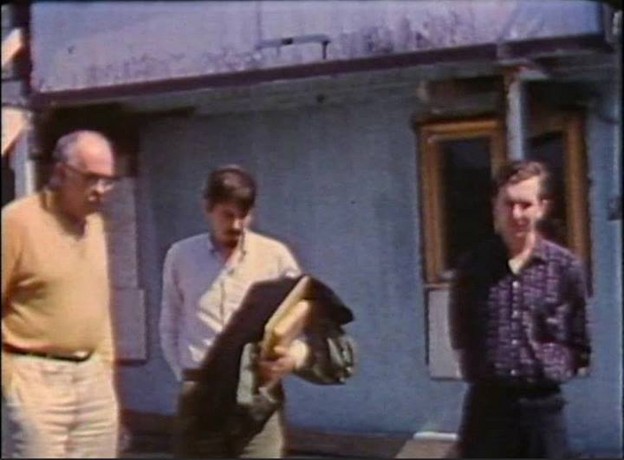 We're closing out the week with a newly added recording of Robert Creeley discussing Charles Olson — who was, in Creeley's words, an "extraordinary comrade and resource all through his life" — and reading from "Maximus, to Gloucester" at the Key West Literary Seminar in 2003.
Here, from a blog post on the KWLS site is Executive Director Arlo Haskell's description of this brief five-minute recording: As part of a panel discussion in 2003, we asked Robert Creeley to read and comment upon one of his favorite poems. It was no surprise when he selected a poem by his great friend and comrade, Charles Olson. Creeley reads passages from his introduction to Olson's Selected Poems, and reads the latter half of Olson's "Maximus, to Gloucester," which concludes: John White had seen it
in his eye
but fourteen men
of whom we know eleven
twenty-two eyes
and the snow flew
where gulls now paper
the skies
where fishing continues
and my heart lies To listen to this recording and many more from Robert Creeley, visit our Robert Creeley author page.
Posted 10/27/2014 (link)
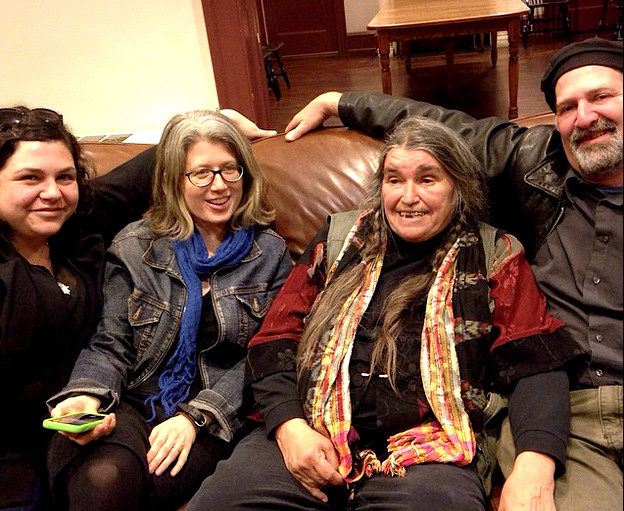 The one and only Bernadette Mayer was in town recently for a very busy day at our own Kelly Writers House.
First, Mayer participated in a live webcast conversation with participants in the free, open online course called ModPo, which can be viewed here.
Next, she recorded a session of PoemTalk focusing on the poem "February" by James Schuyler. That will be released at some point in the relatively near future.
Finally, in the evening, she gave a reading with Philip Good, which you can watch and listen to here. Full descriptions of the day's events can be found here.
From left to right: Erica Kaufman, Julia Bloch, Bernadette Mayer and Philip Good at the Kelly Writers House, October 21, 2014.
Posted 10/28/2014 (link)
 Our own Chris Mustazza has uncovered some very exciting and rare vintage recordings of Harriet Monroe, the founding editor of Poetry magazine, recorded more than eighty years ago. Here's his description of his finds: Harriet Monroe was recorded reading her poetry at Columbia University on January 29, 1932. The recording, made by Barnard professor W. Cabell Greet, was one of the first recordings in a series that came to be known as The Contemporary Poets Series, which began with the recording of Vachel Lindsay in 1931 (available here in PennSound). Several of Greet's recordings were later released on distribution LPs, produced by the National Council of Teachers of English (NCTE), for pedagogical purposes and distributed to schools on a subscription basis. These recordings of Monroe were never released (the reason why is unclear at this time). While there is still research to be done as to how Monroe came to be recorded in this session, it seems likely that Vachel Lindsay would have been the connection between Greet and Monroe. Monroe and Lindsay collaborated over the years, including Monroe writing the introduction for Lindsay's The Congo and Other Poems and her publication of him in Poetry magazine. Lindsay died less than two months before these recordings we made, and so may have helped to arrange the recording session before his death. This is the first time the recordings, originally made on two aluminum records, are being distributed to the public. PennSound wishes to thank the staff at Columbia's Rare Book and Manuscript Library for their help in obtaining and digitizing these recordings, as well as Ann Monroe, for giving us permission, on behalf of the Monroe family, to distribute them. You might also recall Mustazza's Jacket2 "Provenance Report" on the aforementioned NCTE Lindsay recordings from earlier this spring. To listen to these new recordings, click the title above.
Posted 10/31/2014 (link)
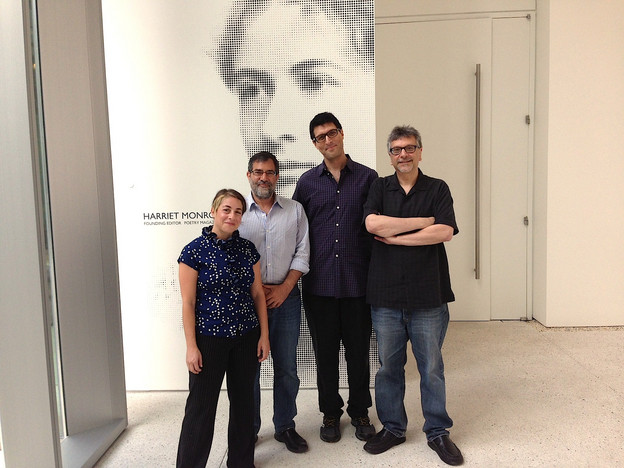 Earlier this week we launched the eighty-second episode in the PoemTalk Podcast series, which focused on Carl Rakosi's poem, "In What Sense I Am I." For this special episode, recorded in Chicago, the panel included (from left to right in the photo at left) Laura Goldstein, host Al Filreis, Anthony Madrid, and Don Share.
In a post on the PoemTalk blog, Filreis begins by discussing the poem's provenance: "The poem appeared in Rakosi's Collected Poems in the mid-1980s, but otherwise the group was not able to date the poem except through internal evidence — and there's plenty of that — although taken all together such evidence leaves things open — for instance, the reference to Eliot's Prufrock. Led by Anthony in particular (who worked out lineation and grammar in an experimental way) the group also pondered the style of line and stanza to guess at whether the poem is early or late. Al insisted on late, influenced not just by the theme of remoteness from self but also by the event in which our recording of Rakosi performing this poem was made. It was a day or two after Rakosi had turned ninety-nine years of age, an audiocast bringing Rakosi's voice into the Kelly Writers House in Philadelphia and thence out to the world of live Internet listeners. We hear the voice of a very elderly poet remembering how the self gets membered in the writing, 'barely discernible' (both Prufrock and himself) and 'seemingly ageless.'" You can read the rest of his introduction on Jacket2.
PoemTalk is a co-production of PennSound, the Kelly Writers House, Jacket2 and the Poetry Founddation. If you're interested in more information on the series or want to hear our archives of previous episodes, please visit the PoemTalk blog, and don't forget that you can subscribe to the series through the iTunes music store.
|
PennSound Daily archive
2025
2024
2023
2022
2021
2020
2019
2018
2017
2016
2015
2014
2013
2012
2011
2010
2009
2008
2007
|











